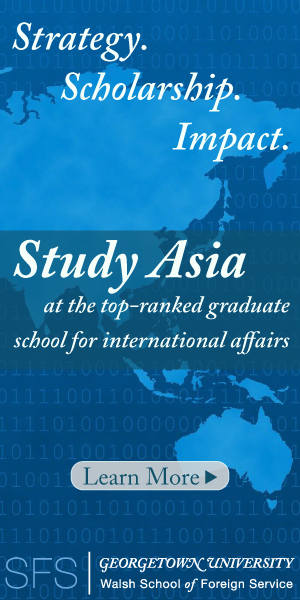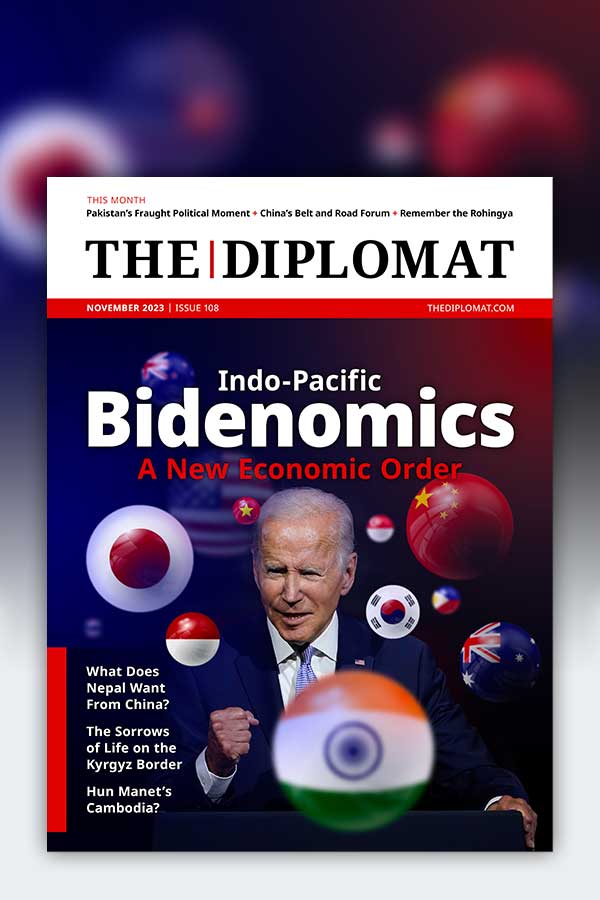| Welcome to the latest issue of Diplomat Brief. This week our top story outlines the complicated political journey of the third-party candidate shaking up Taiwan’s presidential race. We also have an interview with Nicolas Blarel, an associate professor of International Relations at Leiden University, on India’s relationship with Israel. |
| Story of the week | ![[object Object]](https://thediplomat.com/diplomat-brief/2023/vol48/images/feature.jpg?v=1) | Politics From Green to Blue: The Political History of Ko Wen-jeWhat Happened: Last week, Taiwan’s presidential race solidified, with the candidates for president and VP officially registering with the Election Commission. It was the end to a dramatic on-again, off-again effort to forge a political alliance between the KMT and Ko Wen-je, the founder and face of the upstart Taiwan People’s Party. Ko has been polling neck-and-neck with the KMT’s candidate, solidifying his party as a new force to be reckoned with. It’s a remarkable development for a man who began his political career just nine years ago. Our Focus: As journalist Brian Hioe and political scientist Lev Nachman outline for The Diplomat, Ko’s journey has seen him shift from “Green” to “Blue” on Taiwan’s political spectrum (with green being the color of the pro-independence DPP, and blue the color of the pro-unification KMT). Ko got his start by identifying with the 2014 Sunflower Movement, a vocal rejection of the KMT and its China-friendly policies. He won the 2014 Taipei mayoral election as an independent, but with the support of the DPP. Since then, however, Ko has fallen out with the DPP and his views on cross-strait policy in particular have shifted closer to the pan-Blue camp. When asked why he was pursuing the ill-fated unity talks with the KMT, Ko told reporters that he “hates” the KMT, but hates the DPP even more. What Comes Next: As Hioe and Nachman explain, Ko’s popularity is less about any particular policy blueprint and more due to his adept positioning as an outsider. Ko has trumpeted his party as an alternative to the traditional Blue-Green political divide in Taiwan, so he appeals to voters who feel disillusioned with mainstream politics in general. “Today, his base of support is a mixture of jaded Taiwanese who dislike both big parties, young people who find appeal in his quirky personality as a politician, and pan-Blue voters who are unsatisfied with the KMT’s performance,” Hioe and Nachman write. But if Ko can pull off the upset and get elected to office, he will need to embrace a policy direction – and his whiplash-inducting history gives little clue as to what that will be. Read this story |
| Behind the News | INTERVIEW Nicolas BlarelNicolas Blarel, an associate professor at Leiden University in the Netherlands, and author of “The Evolution of India’s Israel Policy: Continuity, Change, and Compromise since 1922,” on the reason for India’s support for Israel in the current conflict: “There is some ideological convergence, as both Zionism and Hindutva support a blending of national and religious identities… [But] the BJP government’s solidarity is more strategic in nature. The BJP believes, like the INC to some degree, that Israel has been a reliable military partner since the Kargil war.” Read the interview |
| This Week in Asia | Northeast Asia The Inter-Korea Military Agreement Is No MoreLast week, North Korea launched a military spy satellite, finally succeding on its third attempt. In response, the Yoon administration in South Korea moved to suspend several provisions of the 2018 inter-Korean military agreement, signed by the previous South Korea president, Moon Jae-in. North Korea used that as an excuse to scrap the deal altogether. South Korean conservatives had long argued the agreement advantaged North Korea, which was accused of violating the ban on certain military activities near the demarcation line. But the erstwhile deal arguably helped keep tensions from breaking out along the heavily fortified border. Find out more | South Asia Bhutan’s Parliamentary ElectionBhutan goes to the polls on November 30, the first phase of a two-step process to elect its National Assembly (and, by extension, the prime minister). It’s a competitive race between five parties, two of whom will win the right to contest the runoff election on January 9. The polls are a testament to Bhutan’s remarkable young democracy; the country has held just three elections since 2008, with each ushering in a peaceful transition of power. Find out more | Southeast Asia Japan, Vietnam Announce Diplomatic UpgradeJapan and Vietnam this week announced a major upgrade to their diplomatic relationship, pledging a broad expansion of security and economic ties. In announcing their new Comprehensive Strategic Partnership for Peace and Prosperity in Asia and the World, Japanese Prime Minister Kishida Fumio and Vietnamese President Vo Van Thuong pledged to take their nations’ ongoing cooperation to “new heights and to further expand it to new fronts.” The upgrade comes two months after similar upgrade in the relationship between Vietnam and the United States, announced during President Joe Biden’s state visit in September. Japan and the U.S. have joined China, Russia, India, and South Korea at the top tier of Vietnam’s diplomatic hierarchy, an apt reflection of the country’s non-aligned and omnidirectional foreign policy. Find out more | Central Asia Why Is the Eurasian Economic Union Broken?The EAEU is largely ineffective in terms of economic cooperation and integration, which are paradoxically its very reasons for being. Not only does the EAEU suffer from enormous internal disagreements and uneven markets, but its prospects for expansion are grim, with serious interest limited to Iran in the wake of the war in Ukraine. Uzbekistan’s interest in joining has apparently stalled at observer status and existing members – like Armenia and Kazakhstan – are not exactly happy about what the union brings them. Find out more |
| Visualizing APAC |  | There is a clear gap in perceptions of gender discrimination in South Korea, with women far more likely than men to see it as common. See the full picture |
| Word of the Week | Society Wae watan o husken darA Baloch proverb expressing longing for home: “One wails for the homeland even if it is as dry as a piece of wooden land.” Find out more |
|  |

![[object Object]](https://thediplomat.com/diplomat-brief/2023/vol48/images/feature.jpg?v=1)

